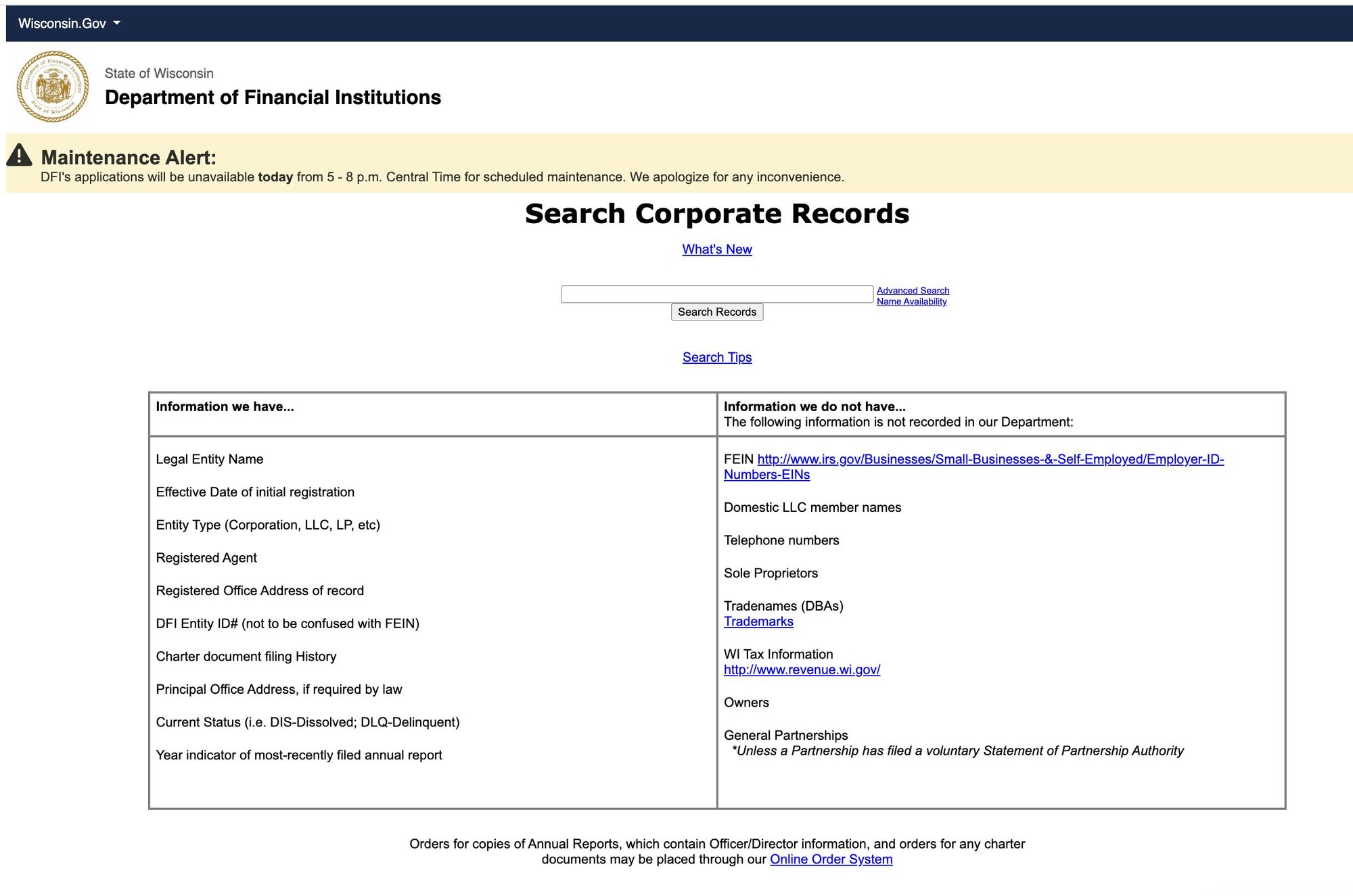A Wisconsin business name search ensures your desired business name is available and compliant with state regulations. Learn how to navigate the process and the essential next steps to open your new business.

Wisconsin Secretary of State business search contact information
Wisconsin Secretary of State (SOS):
- Website: https://sos.wi.gov/
- Phone: 608-266-8888
- Address: Office of the Secretary of State of Wisconsin, State Capitol Building, Room B41W, Madison, WI 53703
- Mailing Address: Office of the Secretary of State, P.O. Box 7848 Madison, WI 53707-7848
- Hours: 8 a.m.–noon, 1 p.m.–4:30 p.m., Monday through Friday
- Email: statesec@wisconsin.gov
Wisconsin Department of Financial Institutions (DFI):
- Website: https://dfi.wi.gov/
- Phone: 608-266-8818
- Address: Office of the Wisconsin Department of Financial Institutions, 4822 Madison Yards Way, Madison, WI 53705, United States
- Mailing Address: Wisconsin Department of Financial Institutions Division of Corporate and Consumer Services, PO Box 93348 Milwaukee, WI 53293-0348
- Hours: 7:45 a.m.-4:30 p.m., Monday through Friday
- Email: DFICorporations@dfi.wisconsin.gov
A step-by-step guide to a WI SOS business search
According to the WI Department of Financial Institutions website, you can simply call the Corporation Bureau at 608-261-7577 and ask an agent to perform a search. However, the pool of available names changes daily, so this may not be the most reliable option.
To conduct a Wisconsin business name search, file an annual report, or search records of existing business entities registered online, follow these steps:
1. Go to the DFI's Corporate Records website
To start a Wisconsin business entity search, enter the WI DFI Corporate Records homepage, type your desired business name or a known business' entity ID into the search bar, and hit enter.

2. Confirm availability
If the name is unavailable, the website will generate a list of the existing businesses that conflict with the availability of the name you entered.
If a name is available, a message will display stating, "Sorry, your search returned no records." In this case, you can either file to form an entity with that name or conduct a more advanced search of similar existing entity names.
Note: Whether a name is actually available isn't guaranteed until the DFI receives, examines, and files either a name reservation form or business registration form.
3. Conduct an advanced search or file an annual report
For an advanced search, type keywords rather than a specific name into the search tool. The page will generate every business entity that exists or previously existed in Wisconsin that matches the words you entered.
4. Click on the entity name of the business you'd like to research
From this page, you can learn more detailed information, such as the entity type, name of the company's registered agent, and filing history. You can also file your annual report, request a certificate of status, or file a Registered Agent or Office Update Form.
5. File a name reservation
If your desired business name is available and clearly distinct from other Wisconsin entities, you can choose to file a name reservation form while you consider other important naming factors.

Why conduct a Wisconsin LLC or entity search?
A Wisconsin LLC search makes it easy to choose a unique name, ensuring your business is immediately recognizable and stands apart from competitors. This process also ensures your business name complies with state regulations and helps protect your LLC from unintentionally violating an existing trademark, which could lead to serious financial consequences.
It's also important to note that prospective LLCs in Wisconsin should conduct their search through the Department of Financial Institutions rather than a WI SOS business search, which is common among most states. Doing so ensures your LLC is compliant with Chapter 183 of the Wisconsin legislature, which states that new LLCs will file their articles of organization with the DFI rather than the Secretary of State.
Important naming guidelines in Wisconsin
Business names must be distinguishable: All business entity names in Wisconsin must be distinguishable from the names of other entities on the DFI's corporate records.
These words or characters don't make a name distinguishable:
- Possessives
- Plurals
- Articles
- Conjunctions
- Prepositions
- Added numbers or letters
- Business entity type identifiers (LLC, Inc., Co., etc.)
Business names must identify the entity’s type: Your business name must include a phrase or acronym that describes the type of business entity you are. For example, an LLC must add some variation of "LLC," "L.L.C.," or "Limited Liability Company."
Business names must avoid misleading language: Your business entity's name must avoid language that implies it's a banking, government, or academic institution.
Other naming considerations
In addition to a WI LLC lookup, consider conducting a broader domain and trademark search to ensure you choose a name that will maximize your business' reach and minimize trademark risks.
Checking domain name availability
An online presence is essential for any modern business. It builds trust, boosts credibility, and provides a platform for reaching a larger audience.
Before you register your business, conduct a domain search to match your business with an available domain name. A service such as GoDaddy or Google Domains will help you ensure the name you choose is also available.
Conducting a trademark search
Trademarks protect a brand's goodwill, or how favorably customers view a brand or specific product in the marketplace. For that reason, trademarks are strictly protected under the law, and infringement cases can be extremely costly and time-consuming. To avoid infringement, search for registered trademarks before you register your business name.
Next steps to start your business in WI
Once you've chosen a name and found a registered agent, start your business by registering it with the appropriate services.
1. Find a registered agent
All business entities filed in Wisconsin need a registered agent. A registered agent is an individual or existing entity that receives legal documents and other important notifications on behalf of your business. While you can be your own registered agent, it’s often much easier to pay for a registered agent service instead.
2. Register your business name
Once you've conducted a Wisconsin LLC search and chosen a unique business name, register your business online through the same DFI website or the One Stop Business Registration website—which registers your business with multiple agencies at once—and pay a fee.
3. Register your domain name
Next, choose a domain registrar such as GoDaddy, Wix, or Bluehost. If you've already searched for available domain names, decide on a domain extension and then purchase your domain.
4. Consider trademarking your business name
A trademark protects the credibility of your business by preventing other entities from profiting off your business name or creating confusion in the marketplace. While this step isn't legally required, there are many benefits to trademarking your business.
5. Obtain an employer identification number (EIN)
If you plan on having employees in the future, you'll need an EIN for federal tax purposes. The process is simple and quick. Go to the Internal Revenue Service (IRS) website to fill out a short form to receive your EIN. The IRS will send you an accompanying letter in the mail.
LegalZoom helps you handle every step—from choosing a business name to filing paperwork with your state.

Wisconsin business searches made easy
At LegalZoom, we simplify the process by doing the hard work for you. Starting a new business is an exciting but time-consuming venture with many moving parts. Our business name search helps you focus on other important things by streamlining the search process and following up with the necessary next steps, such as getting business licenses or creating an LLC.
While agencies like the DFI offer necessary forms and instructions, they can't offer legal advice. Our business law experts ensure that every step meets state and federal regulations and is in your company's best interest.
FAQs
What is a registered agent?
A registered agent is a person or entity who you'll designate to receive official documents on your behalf, such as service of process, annual report forms, and tax forms. Your registered agent must reside in the state of Wisconsin.
How do I register a business in Wisconsin?
- Choose an entity type, such as an LLC, corporation, or partnership.
- Choose a company name that is unique and aligns with state regulations.
- Find a registered agent in your state to handle your legal documents.
- File your business with the One Stop Business Registration Portal to register your business with the relevant agencies, including the Department of Financial Institutions and the Department of Workforce Development.
- Maintain your entity by filing an annual report every year by the due date for the calendar quarter in which you first filed your business entity.
- Quarter 1: If you filed between Jan. 1 and March 31, the due date is March 31.
- Quarter 2: If you filed between April 1 and June 30, the due date is June 30.
- Quarter 3: If you filed between July 1 and Sept. 30, the due date is Sept. 30.
- Quarter 4: If you filed between Oct. 1 and Dec. 31, the due date is Dec. 31.
Which entities are required to file an annual report?
- Agricultural associations
- Common law trusts
- Limited liability partnerships
- Limited partnerships
- Limited liability companies
- Business corporations
- Non-stock corporations
- Cooperative associations
How do I keep my business' name after a merger or acquisition?
For business corporations, non-stock corporations, or cooperatives that are merging, dissolving, or changing your business' name, you can apply to register your old corporate name for up to 10 years. However, the application must be filed simultaneously with the articles of merger, articles of dissolution, or document changing the corporate name.
For business corporations, non-stock corporations, and cooperatives that want to reserve their old names following a merger, dissolution, or name change, simply file a modified name reservation form. In the new form, strike out the designated “term” period and replace it with “10 years.” Then, strike out the designated fee and replace it with “$50.”

